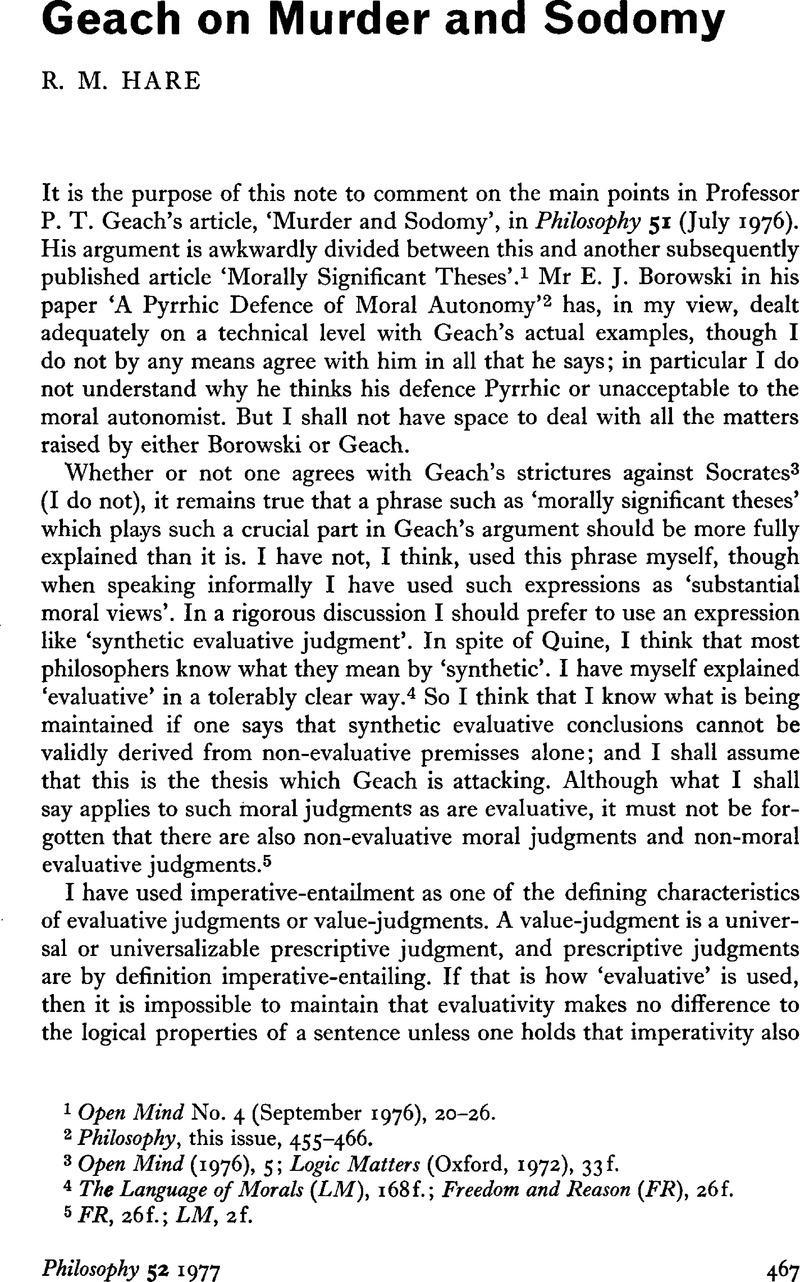Published online by Cambridge University Press: 30 January 2009

1 Open Mind No. 4 (09 1976), 20–26.Google Scholar
2 Philosophy, this issue, 455–466.Google Scholar
3 Open Mind (1976), 5Google Scholar; Logic Matters (Oxford, 1972), 33 f.Google Scholar
4 The Language of Morals (LM), 168f.Google Scholar; Freedom and Reason (FR), 26f.Google Scholar
5 FR, 26f.Google Scholar; LM, 2f.Google Scholar
6 Analysis 18 (1957/8), 51; Logic Matters, 272.Google Scholar The relevant paragraph is unaltered in the reprint, but is retracted on p. 281.
7 Open Mind (1976), 5.Google Scholar
8 Ibid.
9 LM, 28, 30f.Google Scholar
10 Philosophy 52 (1977), 462Google Scholar
11 Philosophy 51 (1976), 347f.Google Scholar
12 ‘Geach: Good and Evil’, Analysis 17 (1956/1957)Google Scholar, reprinted in Theories of Ethics, ed. Foot, P. (Oxford, 1967)Google Scholar and in my Essays on the Moral Concepts (London, 1972)Google Scholar; ‘The Promising Game’, Rev. Int. de Ph. 70 (1964)Google Scholar, reprinted in Theories of Ethics, ed. P. Foot and in The Is-Ought Question, ed. Hudson, W. D. (London, 1969)CrossRefGoogle Scholar; ‘Wanting: Some Pitfalls’, in Agent, Action and Reason, ed. Binkley, R. et al. (Toronto, 1971)CrossRefGoogle Scholar, reprinted in my Practical Inferences (London, 1971)Google Scholar; see also LM, 43f.Google Scholar
13 Philosophy 41 (1966), 75.Google Scholar
14 Philosophy 51 (1976), 346Google Scholar; see LM, 34.Google Scholar
15 Philosophy 52 (1977), 462ff.Google Scholar
16 FR, 32.Google Scholar
17 Philosophy 51 (1976), 347Google Scholar
18 Though a rationalist, I do not subscribe to all the views of those criticized under that name by Professor Alan Gewirth in his Lindley Lecture for 1972 (reprinted in Freedom and Morality, ed. Bricke, J. (Lawrence, Kansas, 1976), 113).Google Scholar I wish to take this opportunity of apologizing to Professor Gewirth for wrongly accusing him, in my own lecture in the same volume (p. 192), of confusing my views with those of a subjectivist who thinks that an act can be shown to be not morally right by showing that it is not acceptable to its agent when he is its recipient. He has pointed out to me that I had no cause, beyond a misreading of his lecture, to take him as including me among the objects of his criticism in that passage.